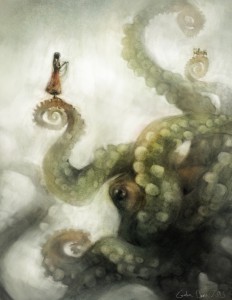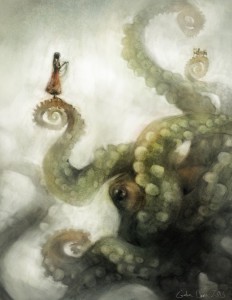NOTE: This post is outdated. Please visit this other article to find out about the updated plan. Other than this introductory note, I leave this post and its comments unchanged so that you can read about the idea if you like.
WHAT ARE THE MULLIGAN AWARDS?
The Mulligan Awards are a response to the joke that is this year’s Hugo ballot. This is for the people who want to compare and contrast great stories and publications that were chosen by the two thousand people who registered and nominated, rather than the opinion of just two or three.
So there will be a final ballot which is based on what non-voting-bloc Hugo voters nominated, an opportunity to vote and, depending on what can be arranged with the parties of interest and the level of interest from fandom, there may be trophies, or a reprint ebook anthology of those on the final ballot who are interested in participating.
WHY ARE THE MULLIGAN AWARDS?
There are a lot of people very upset about how the Hugo ballot turned out this year. No mystery why, since the final ballot is conspicuously off-kilter, matching the Sad Puppies voting bloc slate almost exactly with a bit of Rabid Puppies mixed in. The Hugo rules are set up so that anyone with the price of entry can vote, and there’s nothing to prevent a hivemind like the Correia-Torgersen-Vox collective from forcing whatever they want onto the ballot to take a stance on somethingsomething and prove the point about mumblemumble while only actually accomplishing in transforming the award from something that boils down interests of a bunch of interesting subsets of fandom into a ballot that only the collective itself thinks is worthy.
I will point out that the collective has not broken any rules, but they have made the ballot very dull because it only represents the opinion of three people, rather than the opinion of two thousand.
The biggest loss is the loss of discussion about new and interesting stories that rise out of the woodwork from a group voting in an uncoordinate fashion, which is what I look forward to the Hugos every year for. So the Mulligans are an attempt to salvage something worthwhile from the Hugo year, and give some recognition to authors who deserve it.
HOW DO I NOMINATE FOR THE MULLIGANS?
You already have or haven’t. The nominations will be based on Hugo nomination numbers rather than being a completely separate procedure. Each year the Hugo committee publishes a list of the top 15 nominees with voting counts for each one. The Mulligan nominations start with the Hugo nomination list, but estimates what the top 5 would be in the absence of the voting bloc.
How will it do this? Well, since the bloc has succeeded so thoroughly in sweeping the ballot, this implies that the members of the group followed their leader’s orders and voted slavishly for everything suggested. This should make them easier to spot in the nomination numbers because there will be some things from the voting bloc’s slate that didn’t get votes from anyone else, or almost no one else. That lowest number will give an estimate of how many actually followed orders–the lowest rather than the highest because some of the voting bloc’s choices may have been popular in their own right, and perhaps could have made it on the Hugo ballot without collusion. Then, by subtracting the estimated bloc count from all of the nominees that came from the bloc’s slate, that will be a rough estimate of what the ballot would look like without the bloc’s effects.
Note that this doesn’t automatically knock all stories from the voting bloc off the ballot–if they were legitimately popular in the overall vote, then they could be on the Mulligan ballot too.
These numbers aren’t released until after WorldCon, so the Mulligan final ballot can’t be released until September.
HOW DO I VOTE FOR THE MULLIGANS?
The details for this are still being determined and will be advertised at a later date. Ideally, if there’s some way that eligibility for actual Hugo voting can be verified by those who choose to vote, that would be the best way to keep the voting group similar–but I’m not sure if that will be possible. There will definitely be a way to vote, and it will be based on a rank-order instant-runoff system with “No Award” as an option–and counting will generally work like the published Hugo rules. Except that there will be no 5% minimum for a nominee to be listed.
ARE THE MULLIGANS AFFILIATED WITH THE HUGOS?
No. Not even slightly.
WHAT WAS THAT ABOUT TROPHIES? AND REPRINT ANTHOLOGY?
At the very least I will post a ballot and provide some way to vote. This I can set up for limited cost.
If there is enough interest, I might run a Kickstarter for the Mulligans–if enough of the Mulligan nominees are interested, a reprint ebook anthology paid at 1 cent per word or more. Whether I set up the Kickstarter will depend somewhat on how much interest people express, so if you’d be willing to kick in a few bucks to get a copy, let me know.
BUT MY VOTE IS ONE THAT’S GETTING SUBTRACTED! MY VOICE COUNTS!
If you are a member of the collective, then you can console yourself with the Hugo Awards.
WILL THIS RUN EVERY YEAR?
I sincerely hope it won’t need to. But if a bloc dominates again, I’ll consider it.

![Pageflex Persona [document: PRS0000039_00012]](https://www.diabolicalplots.com/wp-content/uploads/2015/11/Long-List-BookCoverebook-200x300.jpg)

